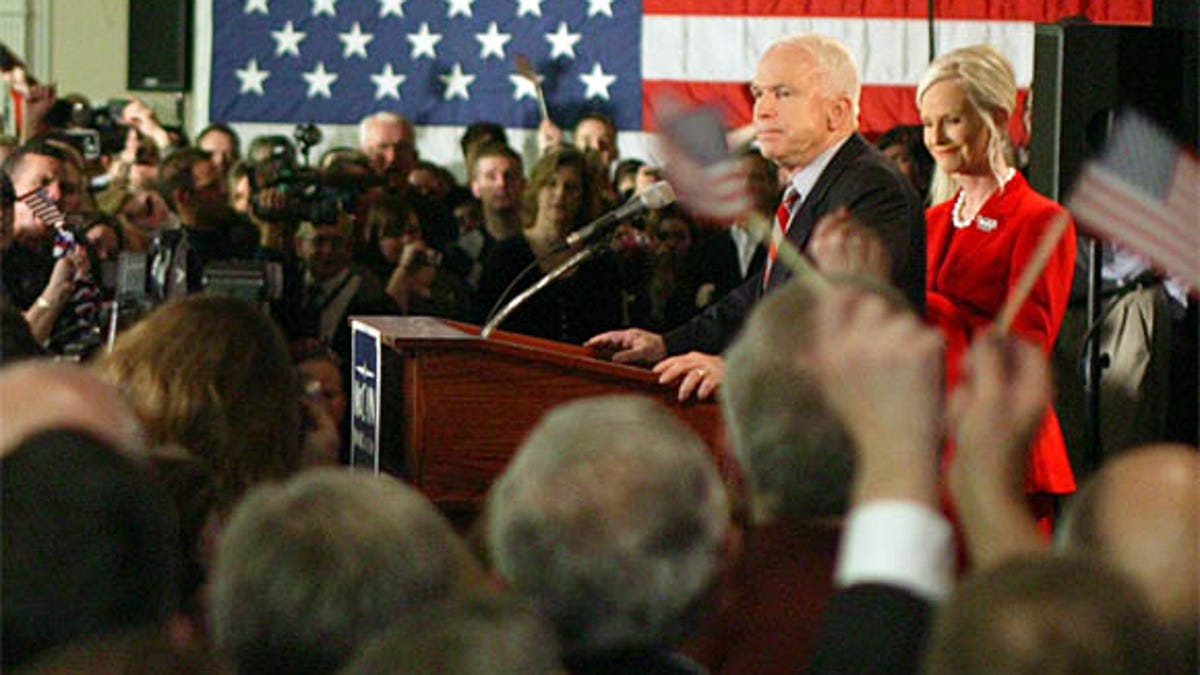Handshakes, not the Internet, win N.H. for Clinton and McCain
The New Hampshire presidential primary showed that two candidates who are underdogs on the Internet are perfectly viable in the real world.

NASHUA, N.H.--Hillary Clinton and John McCain won Tuesday's New Hampshire primaries the old-fashioned way: trekking to scores of coffee houses, diners, and high school gymnasiums. They shook hands, answered questions, and eventually convinced a plurality of voters.
This was politicking at its most traditional, employing venerable tactics like McCain's Straight Talk Express bus tour and Clinton's "Time to Pick a President" meetings with voters. By the time the polls closed, it was a rare Granite State resident who managed to avoid in-person contact with a would-be president or a pushy surrogate.
In other words, it was anything but high-tech. Sure, there were robo-calls and e-mail alerts, but, for the most part, the local events that convinced voters to pick Clinton and McCain could have been convened at any point in the last century.
One example: the day after losing in the Iowa caucuses, Clinton asked supporters to meet her at a hangar at the airport here in the frosty pre-dawn gloom. It was a miserable day not only for campaign aides but also for locals, with temperatures at the event hovering around minus 6 degrees Fahrenheit. The Democratic senator showed up, responded to questions, and departed in a coach emblazoned with "BIG CHALLENGES, REAL SOLUTIONS, TIME TO PICK A PRESIDENT" in bold letters.
Another example: employees of defense contractor BAE Systems crowded into a small auditorium to hear McCain speak, and, when that filled up, crowded into the main lobby to watch his remarks on a screen. The Republican senator spoke for half an hour, and, when the event was over, the workers waited patiently for the chance to shake McCain's hand or glimpse his campaign bus on the way out.
New Hampshire residents love it. More precisely, they claim to be annoyed by candidates and journalists interrupting their meals at diners and parking on their lawns when nearby events fill up, but they savor their chance to influence a presidential election and they take this role seriously.
Not only did Clinton's and McCain's tiresome, repetitive, voice-hoarsening efforts work, they nicely put into perspective the clamor that has arisen over social networks and other Internet popularity contests.
Neither of those candidates was a favorite online. Barack Obama, who came in second in the New Hampshire Democratic primary, has 219,707 MySpace "friends" to Clinton's 160,414. Obama and John Edwards each had more viewers on YouTube than Clinton did. Obama had around four times the number of "Eventful" demands for a visit than Clinton did and more than three times the Facebook friends.
And by any Internet metric, Texas Rep. Ron Paul should have captured the lion's share of the GOP vote in New Hampshire. He's arguably the Internet's favorite candidate, with Google engineers campaigning for him here, a remarkable lead on Eventful and Facebook, and 111,757 MySpace "friends" to McCain's mere 40,770.
Instead, Paul received just 8 percent of the vote (which is somewhat surprising after a weekend poll put him at 14 percent).
The reason for this, of course, is that Paul and Obama supporters tend to be young and tech savvy, which gives them disproportionate representation online. They flood online polls. They feverishly add their preferred candidate to their social networks. They organize, and raise funds, incredibly well.
There's nothing wrong with that. But in presidential elections, votes matter, and those in Iowa and New Hampshire matter the most. Exercises in online nose-counting like press releases heralding the so-called "MySpace primary" don't.
To be sure, online politicking has been part of the 2008 election. The YouTube debates proved to be a provocative exercise in user-generated content, Meetup and MoveOn changed the way activism works, and e-mail lets campaigns stay in touch with voters and volunteers. As Paul devotees know, online fundraising is a powerful tool.
Journalists love these metrics (see above for the obligatory MySpace statistics) because they're easy to measure and report. But Tuesday's results should be a cautionary tale: votes matter. In-person meetings matter. Handshakes matter. MySpace friends don't.
CNET News.com's Anne Broache contributed to this report.

